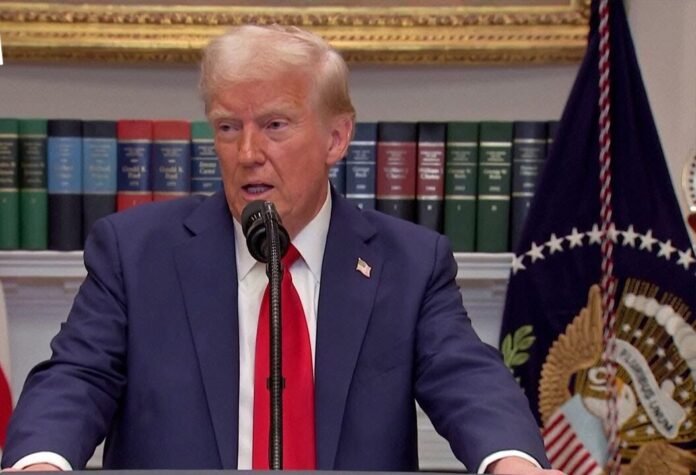Trump warns Putin that failure to end the war will trigger severe sanctions, threatening Russia’s economy
In a stark warning to Russian President Vladimir Putin, former US President Donald Trump declared that if Russia fails to end its ongoing war in Ukraine, he will impose crippling sanctions and high tariffs on Russian exports. Posting on his Truth Social platform, Trump made his position clear, stating, “Settle now, and STOP this ridiculous war! It’s only going to get worse.” His message emphasised that Russia’s already faltering economy could face even more devastation if Putin does not immediately seek a peaceful resolution.
Trump’s remarks come amid the ongoing Russian invasion of Ukraine, which began nearly three years ago, in February 2022. Throughout the war, President Putin has maintained that Ukraine must accept Russia’s territorial gains if peace talks are to proceed. However, Ukraine has steadfastly rejected any notion of conceding its land, while also bolstering its defences against Russia’s advances. President Zelensky of Ukraine has made it clear that Russian aggression will not be tolerated, even as he hints at possible compromises, such as temporarily ceding occupied territories for the sake of peace.
Despite his previous stance that he could broker a peace deal in a single day, Trump now promises further action if Putin continues to refuse negotiations. He stated, “If we don’t make a deal, and soon, I have no other choice but to put high levels of taxes, tariffs, and sanctions on anything being sold by Russia to the United States, and various other participating countries.” The severity of these measures would undoubtedly devastate Russia’s economy, which is already grappling with the consequences of Western sanctions imposed since the start of the war.
While Trump’s approach may resonate with some members of the international community who believe Russia must be made to pay a higher price for its aggression, Ukraine’s government has expressed scepticism. Senior Ukrainian officials have been calling for more tangible measures to curb Russia’s ability to wage war, and many are less inclined to trust rhetoric without concrete action. As a result, they are demanding that the US and its allies do more than issue threats and warnings, pushing for immediate economic penalties and military support.
In Moscow, some signs are emerging that the Kremlin may be preparing the Russian public for a possible negotiation settlement. Prominent pro-Putin figures in the media have begun to speak of the need for a “realistic” end to the war. This includes halting fighting along the current frontlines and perhaps accepting Ukrainian control over areas that Russia illegally annexed two years ago. However, such rhetoric has sparked outrage among Russian hardliners, who still believe in the idea of a full-scale victory.
Trump’s comments also featured an appeal to the Russian people, emphasising his respect for the Soviet Union’s sacrifices during World War II. However, his exaggerated estimates of Soviet losses have raised eyebrows, particularly among Ukrainians, who view the statement as a distortion of history. Nonetheless, Trump’s tone appears to be shifting, signalling that he may be positioning himself as a more hardline figure on Russia than he was during his first term in office.
Ukrainians, on the other hand, are wary of what may come of Trump’s threats. While many of them have long believed that Putin understands only strength, there is little faith that mere sanctions will bring an end to the war. The uncertainty surrounding the potential for peace talks remains as high as ever, with the crucial question being what concessions Russia is willing to make in order to cease hostilities.
Trump’s position may be gaining traction among those who feel the US should take a tougher stance against Putin. However, after nearly a decade of conflict and little progress towards peace, many Ukrainians remain doubtful. They are left hoping that action, not words, will lead to the resolution they desperately need.
